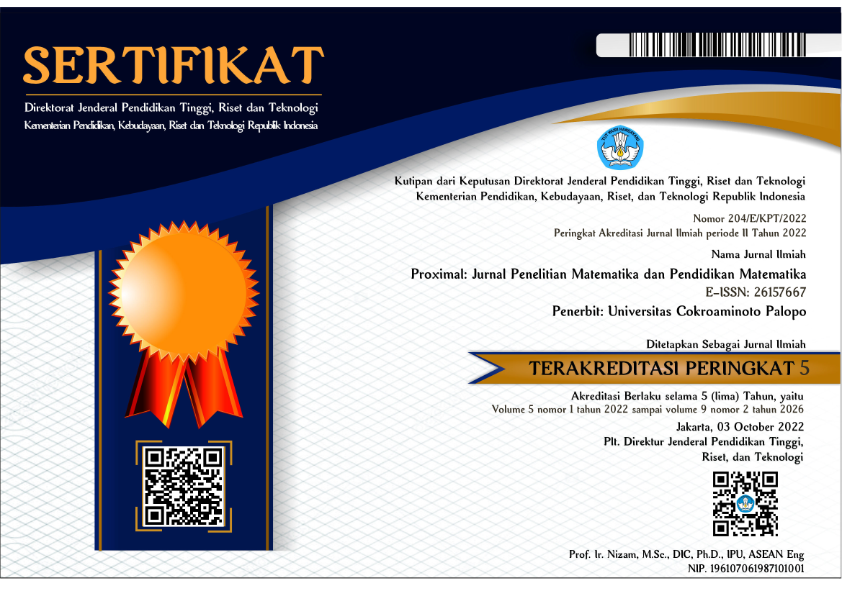PENGARUH MODEL PEMBELAJARAN EXAMPLE NON EXAMPLE TERHADAP KEMAMPUAN PEMECAHAN MASALAH MATEMATIKA SISWA SMP
Keywords:
Model Pembelajaran Example non Example, Kemampuan Pemecahan MasalahAbstract
Penelitian ini adalah penelitian eksperimen yang melibatkan satu kelas. Penelitian ini bertujuan untuk mengetahui pengaruh Model Pembelajaran Example Non Example terhadap kemampuan pemecahan masalah matematika siswa SMP Negeri 2 Palopo, dengan kriteria pengaruh (1) kemampuan pemecahan masalah matematika siswa yang diajar dengan menggunakan Model Pembelajaran Example Non Example, (2) gain ternormalisasi siswa setelah diajar dengan Model Pembelajaran Example Non Example, (3) aktivitas belajar siswa selama diajar dengan menggunakan Model Pembelajaran Example Non Example, (4) respon siswa setelah diajar dengan menggunakan Model Pembelajaran Example Non Example. (5) peningkatan kemampuan pemecahan masalah matematika siswa setelah diajar dengan Model Pembelajaran Example Non Example. Berdasarkan kriteria keefektifan pembelajaran dapat disimpulkan bahwa terdapat peningkatan kemampuan pemecahan masalah matematika siswa setelah penerapan Model Pembelajaran Example Non ExampleDownloads
Download data is not yet available.
References
Sartika. 2015. Pengaruh Pendekatan Contextual Teaching and Learning terhadap Hasil Belajar Siswa Kelas VII SMP Negeri 6 Palopo. Skripsi tidak diterbitkan. Palopo: FKIP-UNCP
Hertiavi, M. A., Langlang, H., & Khanafiyah, S. 2016. Penerapan Model Pembelajaran Kooperatif Tipe Jigsaw untuk Peningkatan Kemampuan Pemecahan Masalah Siswa SMP. Jurnal Pendidikan Fisika Indonesia, 6(1).
Ilyas, M. 2015. Metodologi Penelitian Pendidikan Matematika. Bandung: Pustaka Ramadhan.
Imun, Y. 2018. Pengaruh Penerapan Pendekatan Problem Posing Terhadap Kemampuan Pemahaman Matematis Siswa Kelas X SMA FRATER Palopo. Skripsi tidak Diterbitkan. Palopo: FKIP-UNCP.
Lestari, D. W. 2019. Pengaruh Model Pembelajaran Kooperatif Tipe Scramble dengan Pendekatan Problem Solving Terhadap Kemampuan Pemecahan Masalah Matematika Siswa. Skripsi tidak diterbitkan. Palopo: FKIP-UNCP
Mufarida, Ana. 2008. “Kemampuan Siswa Dalam Memecahkan Masalah Matematika Berbentuk Soal Terbuka Pada Materi Jajargenjang di Kelas VII-C SMP Negeri 1 Bangsal Mojokerto” Skripsi diterbitkan.
R Rianti - Jurnal Pendidikan Tambusai, 2018 - jptam.org
Surya, Pika dan Ika Rahmawati. 2017. Pengaruh Penggunaan Model Pembelajaran Contextual Teaching Learning (CTL) Terhadap Hasil Belajar Bilangan Cacah di Kelas II SDN Dander Bojonegoro. Surabaya: Jurnal PGSD. Volume 05 Nomor 03
Sumartini, T.S. 2016. Peningkatan Kemampuan Pemecahan Masalah Matematis Siswa Melalui Pembelajaran Berbasis Masalah. Jurnal Pendidikan Matematika STKIP Garut, Vol. 5, No. 2.
Yusnidah. 2018. Pengaruh Model Kooperatif Tipe Team Assisted Individualization (TAI) dengan Pendekatan Problem Solving Terhadap Kemampuan Pemecahan Masalah Matematika Siswa SMP Negeri 3 Palopo. Skripsi tidak diterbitkan. Palopo: FKIP-UNCP
Hertiavi, M. A., Langlang, H., & Khanafiyah, S. 2016. Penerapan Model Pembelajaran Kooperatif Tipe Jigsaw untuk Peningkatan Kemampuan Pemecahan Masalah Siswa SMP. Jurnal Pendidikan Fisika Indonesia, 6(1).
Ilyas, M. 2015. Metodologi Penelitian Pendidikan Matematika. Bandung: Pustaka Ramadhan.
Imun, Y. 2018. Pengaruh Penerapan Pendekatan Problem Posing Terhadap Kemampuan Pemahaman Matematis Siswa Kelas X SMA FRATER Palopo. Skripsi tidak Diterbitkan. Palopo: FKIP-UNCP.
Lestari, D. W. 2019. Pengaruh Model Pembelajaran Kooperatif Tipe Scramble dengan Pendekatan Problem Solving Terhadap Kemampuan Pemecahan Masalah Matematika Siswa. Skripsi tidak diterbitkan. Palopo: FKIP-UNCP
Mufarida, Ana. 2008. “Kemampuan Siswa Dalam Memecahkan Masalah Matematika Berbentuk Soal Terbuka Pada Materi Jajargenjang di Kelas VII-C SMP Negeri 1 Bangsal Mojokerto” Skripsi diterbitkan.
R Rianti - Jurnal Pendidikan Tambusai, 2018 - jptam.org
Surya, Pika dan Ika Rahmawati. 2017. Pengaruh Penggunaan Model Pembelajaran Contextual Teaching Learning (CTL) Terhadap Hasil Belajar Bilangan Cacah di Kelas II SDN Dander Bojonegoro. Surabaya: Jurnal PGSD. Volume 05 Nomor 03
Sumartini, T.S. 2016. Peningkatan Kemampuan Pemecahan Masalah Matematis Siswa Melalui Pembelajaran Berbasis Masalah. Jurnal Pendidikan Matematika STKIP Garut, Vol. 5, No. 2.
Yusnidah. 2018. Pengaruh Model Kooperatif Tipe Team Assisted Individualization (TAI) dengan Pendekatan Problem Solving Terhadap Kemampuan Pemecahan Masalah Matematika Siswa SMP Negeri 3 Palopo. Skripsi tidak diterbitkan. Palopo: FKIP-UNCP
Downloads
Published
2020-11-30
How to Cite
Marsuki, R., Ilyas, M., & Ashari, N. W. (2020). PENGARUH MODEL PEMBELAJARAN EXAMPLE NON EXAMPLE TERHADAP KEMAMPUAN PEMECAHAN MASALAH MATEMATIKA SISWA SMP. Proximal: Jurnal Penelitian Matematika Dan Pendidikan Matematika, 3(2), 76–87. Retrieved from https://www.e-journal.my.id/proximal/article/view/489
Issue
Section
Articles
License
In submitting the manuscript to the journal, the authors certify that:
- They are authorized by their co-authors to enter into these arrangements.
- The work described has not been formally published before, except in the form of an abstract or as part of a published lecture, review, thesis, or overlay journal.
- That it is not under consideration for publication elsewhere,
- That its publication has been approved by all the author(s) and by the responsible authorities – tacitly or explicitly – of the institutes where the work has been carried out.
- They secure the right to reproduce any material that has already been published or copyrighted elsewhere.
- They agree to the following license and copyright agreement.
License and Copyright Agreement
Authors who publish with this journal agree to the following terms:
- Authors retain copyright and grant the journal right of first publication with the work simultaneously licensed under Creative Commons Attribution License (CC BY 4.0) that allows others to share the work with an acknowledgment of the work's authorship and initial publication in this journal.
- Authors are able to enter into separate, additional contractual arrangements for the non-exclusive distribution of the journal's published version of the work (e.g., post it to an institutional repository or publish it in a book), with an acknowledgment of its initial publication in this journal.
- Authors are permitted and encouraged to post their work online (e.g., in institutional repositories or on their website) prior to and during the submission process, as it can lead to productive exchanges, as well as earlier and greater citation of published work.
















